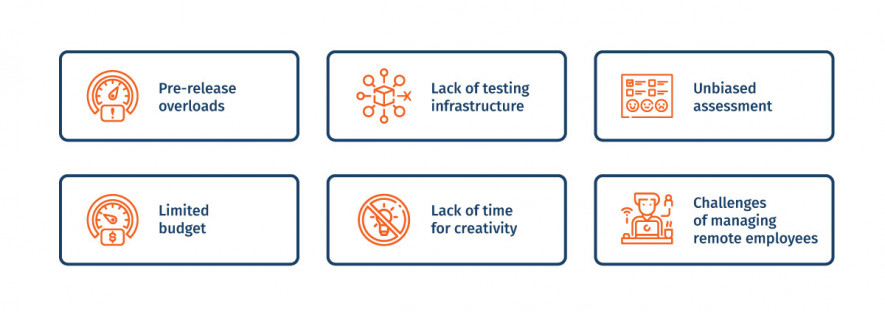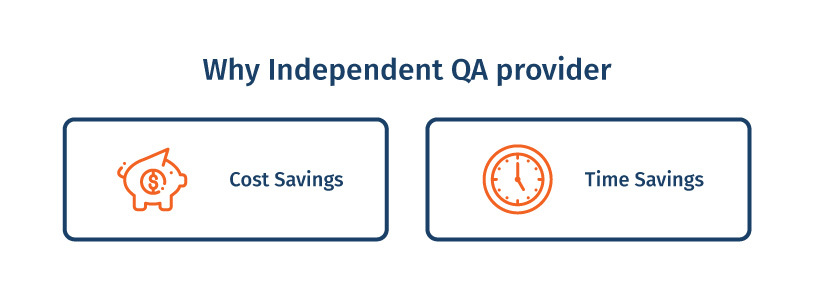Game Software Testing: Cases for enhancing in-house team
by Kate Libbie | April 16, 2020 8:06 am
Complex logic, sophisticated graphics, intricate design – game development very much contrasts with other IT areas and hence requires appropriate testing. For in-house teams, such a multi-component nature requires selecting a unique approach and having a solid understanding of the product. But, these tasks are not always easy-to-be-conduct.
Independent QA[1] provider, in its turn, has all the necessary experience of facing various testing challenges and scenarios and so can select a proper approach to solving the task much faster. After all, all this can significantly enhance an in-house QA, and that’s why majority game developers choose independent QA.
So, how do big companies implement quality assurance for game testing and other tasks? Here are the real cases from our experience of working with projects in the game industry.
6 Case Studies: Challenges of QA Game testing
As mentioned before, in-house teams can face a variety of scenarios when everything goes unexpectedly wrong. Here are a few of those cases in the game industry and its possible solutions:

Case #1 Pre-release overloads
When it comes to release, there are always additional bugs or problems appearing on the surface. Designer can redraw one or a few heroes, the developer may decide to change some strategy and so on. Even if all units of games are tested thoroughly, everything can change when all the components come together into one integral product.
Problem: Urgency and tight time frames before game product release make it difficult for an in-house team to adjust to new requirements.
Solution: In case of falling deadlines, a trustworthy independent provider can hedge in-house team in solving urgent tasks.
Being an Independent QA provider, QATestLab[2] is ready to join the project anytime in the product development lifecycle:
“30% of our projects include testing activities before release. If needed, we can scale a team within 1-3 days and so provide urgent help before release.”
– comments Michael, a specialist on quality assurance in QATestLab.
Case #2 Limited Budget
Game development in itself is an expensive thing. In addition to this, development and support teams may face new problems that, in turn, require even more time and money. Fitting into the planned budget becomes even more difficult: the scheduled timeframe for the testing department is narrowing, release dates are delayed, everyone is dissatisfied…
Problem: To finish work on time, the company has to spend additional time and money on hiring new staff and expanding the internal QA team[3].
Solution: Independent QA provider is considered a cost-effective method[4]. In essence, you get a ready-to-work team that conducts processes of recruitment, training, and infrastructural development internally, which means you don’t have to pay for it.

Case #3 Lack of testing infrastructure
The majority think the essential things in game development are vivid design, exciting concept, and perfect GUI. But all this falls short behind if you ignore compatibility issues.
To succeed in software testing, and especially in game projects, you need to check whether your app is compatible with all relevant devices.
Problem: The devices market is expanding every day. It is rather challenging to buy dozens of smartphones, tablets, and laptops. All that comes at a big price.
Solution: Some Independent QA vendors provide testing on real devices without spending money to buy them.
QATestLab is one of such providers that keep in touch with the latest trends and update the portfolio of devices.
Here is what Ivan, QA Lead at QATestLab, saying about that:
“Our testing infrastructure includes 250+ mobile devices: Android, iOS, 40+ testing tools. All of them are available for our clients on demand without paying additional costs.”
Case #4 Lack of time for creativity
A thoughtful product, and especially game application, that interests the user takes lots of time for creativity.
Problem: The unpredictable nature of product testing and development often limits your time to focus on creative tasks and more global issues.
Solution: Delegating a particular scope of work to a third party, you can free your time to focus on core business matters.
With QATestLab, you can fully delegate responsibility for specific tasks and get the expected result.
“We can take full control over the testing process. Our project manager is usually responsible for the quality of the project at the top level. Every project has assigned QA Lead[5], who manages all testing activities, sets tasks, and controls the working load of QA engineers. QA Lead is a point of contact between the in-house testing team and our QA engineers. He takes part in every meeting and provides all the information about the work done.”
– explains Michael.
Case #5 Unbiased assessment
Like a writer’s work needs to be checked by an editor, your game should be reviewed by someone who’s not related to the process of its creation.
Problem: When you work on the project for a long time, it is not easy to take a fresh look at it.
Solution: Due to considerable experience, an Independent testing company can spot issues that your staff could overlook. Moreover, the QA provider will give you valuable feedback and suggestions on improvement.
“During our testing activities, we often apply the “Think aloud” technique. Moving through the user interface testers continuously share their thoughts and impressions on the game. That provides valuable insight for the client on the game perception by its end users.”
– comments Michael.
Case #6 Challenges of managing remote employees
The organization of work, and especially for remote teams often leaves many questions open. By attracting additional resources to your project, you delegate your tasks and therefore transfer control of those tasks to other teams.
Problem: Even if companies need to delegate tasks to third-party providers, they still doubt this decision.
Solution: Choose vendors that provide complete testing documentation and detailed regular reports.
QATestLab provides clear and regular communications and reporting between our engineers and in-house testing team.
“We adjust to set processes if required. You are free to contact every team member. The communication can be implemented via Slack, Skype for Business, Discord or any other system suitable for the client. Mornings usually start from meetings with the client, and at the end of every working day, we provide a detailed report about the work done (on demand).”
– comments Michael.
Why do companies choose independent testing?
The Software Development Life Cycle is hard to be predicted, estimated, and calculated in advance. Urgent release, limited budget – these only a few problems you may stumble while producing your software. When it comes to minimizing such risks, an Independent testing provider can be a great rescue for game developers and not only to save time and money.
Since independent teams have all the necessary knowledge and experience in software testing methodology, they are ‘pure players’. This escalator will take you up, but you should watch your steps. Choose a reliable partner who does believe in games as much as you do and concentrates your efforts on the exciting process of game creation[6].
Game Testing Department in QATestLab: Our game testing team unites 35+ professional QA engineers who are passionate game players as well. We have successfully accomplished 500+ projects and accumulated competencies in the testing of different kinds of mobile games, PC, browser, and VR games. Every day we test games on 200+ mobile devices and PC with various capacities +HTC VIVE. And guess what we do after work? We are playing games!
Learn more from QATestLab
Related Posts:
- Independent QA: https://qatestlab.com/solutions/by-development-stage/independent-testing/
- QATestLab: https://qatestlab.com/
- QA team: https://blog.qatestlab.com/2019/05/07/building-qa-team/
- cost-effective method: https://blog.qatestlab.com/2017/11/16/software-testing-battle/
- QA Lead: https://blog.qatestlab.com/2019/04/25/qa-leads-responsibilities/
- game creation: https://qatestlab.com/solutions/by-focus-area/games/
- How to stay optimistic and lead your company out of a crisis?: https://blog.qatestlab.com/2020/04/24/lead-company-out-of-a-crisis/
- How independent testing helped to win the court (Real Case!): https://blog.qatestlab.com/2019/01/31/independent-testing-court/
- 5 Reasons to hand your testing over to dedicated team: https://blog.qatestlab.com/2017/11/08/dedicated-qa-team/
Source URL: https://blog.qatestlab.com/2020/04/16/independent-in-house-testing/

